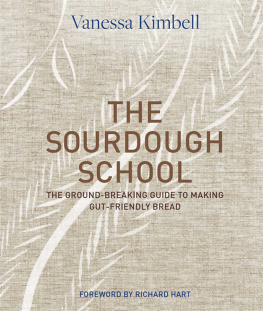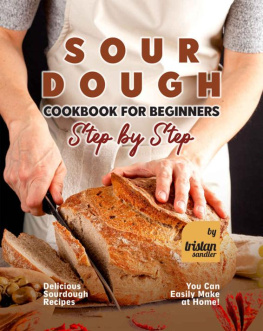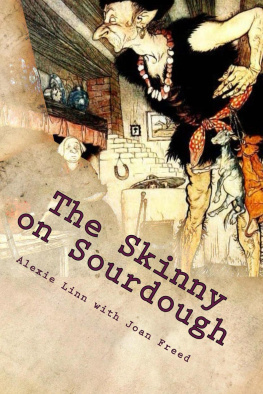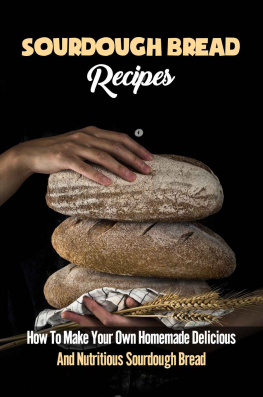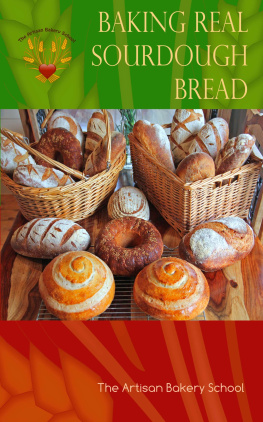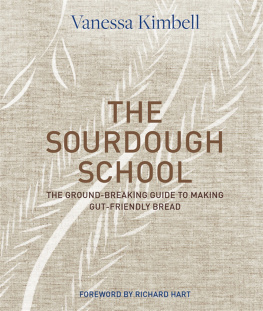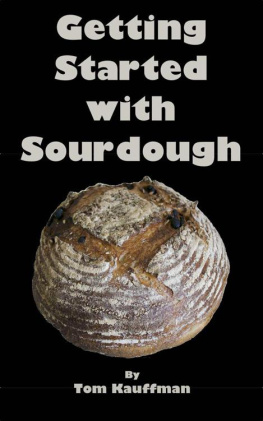Kimbell - The Sourdough School
Here you can read online Kimbell - The Sourdough School full text of the book (entire story) in english for free. Download pdf and epub, get meaning, cover and reviews about this ebook. City: London, year: 2018, publisher: Octopus;Kyle Books, genre: Home and family. Description of the work, (preface) as well as reviews are available. Best literature library LitArk.com created for fans of good reading and offers a wide selection of genres:
Romance novel
Science fiction
Adventure
Detective
Science
History
Home and family
Prose
Art
Politics
Computer
Non-fiction
Religion
Business
Children
Humor
Choose a favorite category and find really read worthwhile books. Enjoy immersion in the world of imagination, feel the emotions of the characters or learn something new for yourself, make an fascinating discovery.
- Book:The Sourdough School
- Author:
- Publisher:Octopus;Kyle Books
- Genre:
- Year:2018
- City:London
- Rating:3 / 5
- Favourites:Add to favourites
- Your mark:
- 60
- 1
- 2
- 3
- 4
- 5
The Sourdough School: summary, description and annotation
We offer to read an annotation, description, summary or preface (depends on what the author of the book "The Sourdough School" wrote himself). If you haven't found the necessary information about the book — write in the comments, we will try to find it.
The Sourdough School — read online for free the complete book (whole text) full work
Below is the text of the book, divided by pages. System saving the place of the last page read, allows you to conveniently read the book "The Sourdough School" online for free, without having to search again every time where you left off. Put a bookmark, and you can go to the page where you finished reading at any time.
Font size:
Interval:
Bookmark:



by Richard Hart
I havent always been a baker. I started my career in baking at the age of 30 and it quickly became an obsession an obsession that drove me from never having made a loaf of bread to being Head Baker at Tartine in a matter of years. Now I have gone on to partner with Noma, and I am in the process of opening my own Harts Bakeries to share my knowledge and love of sourdough.
I first met Vanessa while still at Tartine, when she came to interview me about sourdough for BBC Radio 4s Food Programme. It quickly became clear that Vanessa shared my obsession, and we speak often, talking bread and techniques. We also share a belief that great bread is for everyone.
The art of bread baking takes time, dedication and practice. You cant just follow a formula; you have to develop an understanding with your bread. Sourdough is a living thing, its challenging and requires love and care. Its influenced not only by the environment in which its made, but where the ingredients are grown, and as a baker you need to pay attention to every detail.
In this book Vanessa gives you the tools you need to be a successful baker. If you take this knowledge and focus you will be rewarded with beautiful, freshly baked bread. Making sourdough is addictive and there is nothing better than pulling a handmade loaf out of the oven.
Making bread using a sourdough starter also gives you better bread. The texture and flavour are far superior to that of a yeasted loaf. Sourdough bread is also fundamentally better for your body. The bacteria in the sourdough help break down the flour, which makes it more digestible and nutritious. Vanessa has a unique understanding of this process, which she shares with you here, and the fact that sourdough bread is more nourishing.
This book is interactive. It shouldnt just be followed like a regular formula book. You should pick it up and read it thoroughly and use it as a series of steps to help you best understand your own environment and flour. Its not easy. You need to be completely aware of your ingredients and surroundings, to pay attention to your starter and dough and listen to what it needs. You will make mistakes and constantly question yourself. Every time something went wrong with my bread, I took it as an opportunity to learn and succeed. This book and the sourdough loaf records will help you do the same.


My first memory of sourdough was aged nine. Wed been travelling to Dordogne for about 14 hours. As we approached the village that was to become the place we spent my remaining childhood holidays, I looked out of the car window: there was a fortress-like church with a huge bell, which was surrounded by fields full of fresh green grass, cowslips and gnarled old walnut trees. We stopped at the hotel restaurant and I got out of the car. I remember how happy I was as we were brought potage and baskets filled with hunks of fresh cut bread. It was so different from the bread in England. The crumb was chewy and tasted lightly sour and the crusts were as rugged as the bark of the walnut trees. At that moment I fell in love.
It turned out that the bakery was just yards from our house, and so by the time I was 11, I was working in the local bakery. Id sweep up, knock out and stack up the bannetons (wicker baskets), brush down the loaves as they came out of the oven and serve the customers. I was often given some dough to shape and allowed to bake it. Everyone from the village, rich and poor alike, bought their bread fresh every morning. I knew everyone, and everyone knew me.
Id leave the bakery mid-morning and take the bread to the restaurant, where I would help Angelique in the kitchen, stirring the soup, fetching butter from the farm, stoning wild plums for tarts and feeding the carrot tops to the rabbits. As I got older, I would waitress, often serving the same people Id served in the bakery earlier in the day. After lunch, Id carry the previous days bread in a sack back to my friend Noels farm and feed it to the pigs.
Back in the UK I left school and trained as a chef and baker then, at the age of 18, I returned to France and promptly fell for a handsome Frenchman from the local village. His father got me a job as an apprentice in the local town bakery where I stayed for a year, baking sourdough, brioches, tarts and patisserie. It was amazing, but the hours were long and the pay minimal, and I wanted more, so I returned to the UK thinking I would put my skills to use in a British bakery. But in the early 1990s finding somewhere where they baked sourdough was almost impossible. I was literally laughed out of one bakery when I explained how we fermented the dough using old dough from the previous day, otherwise known as pte fermente or pre-ferment.
Instead I found freedom working early shifts in a hotel making French patisseries. I was finished by 9am, so in the day I went to university. I didnt sleep much at the end of my last term at university and I became ill. I was given large doses of antibiotics, after which, at the age of 24 and to my total dismay, I could no longer digest any wheat. The doctors couldnt explain why, so I stopped baking, changed career and followed a gluten-free diet for almost four years. It was miserable.
During this time Id avoided France because bread was everywhere, but in 1998 I returned to show my now husband my French home. As I walked past the bakery on my first day back, I smelled the freshly baked bread. Herv the baker was so happy to see me that he pressed a warm miche (pain de campagne) into my hands. It smelt so good. I found myself moments later at the kitchen table, oblivious to the rest of the world, devouring half the loaf in one sitting. My husband walked into the kitchen to find me sitting in a pile of crumbs with my head in my hands as it dawned on me that I was going to be ill... very ill. I braced myself for what was to come: asthma, joint pain, a foggy head, tiredness, irritability, bloating, eczema and digestive issues. But, to my surprise, I wasnt ill. I was fine. I spent the next two weeks making up for lost time eating as much bread as I could. It was heaven. When I got home to the UK I went out, bought a loaf of bread, ate it and was promptly ill. It was then that I realised that the bread I had grown up eating in France was digestible, but the commercial bread I was eating in the UK was not. In that moment the direction of my life changed and I decided that I had to understand what was so different about sourdough.
Next pageFont size:
Interval:
Bookmark:
Similar books «The Sourdough School»
Look at similar books to The Sourdough School. We have selected literature similar in name and meaning in the hope of providing readers with more options to find new, interesting, not yet read works.
Discussion, reviews of the book The Sourdough School and just readers' own opinions. Leave your comments, write what you think about the work, its meaning or the main characters. Specify what exactly you liked and what you didn't like, and why you think so.

